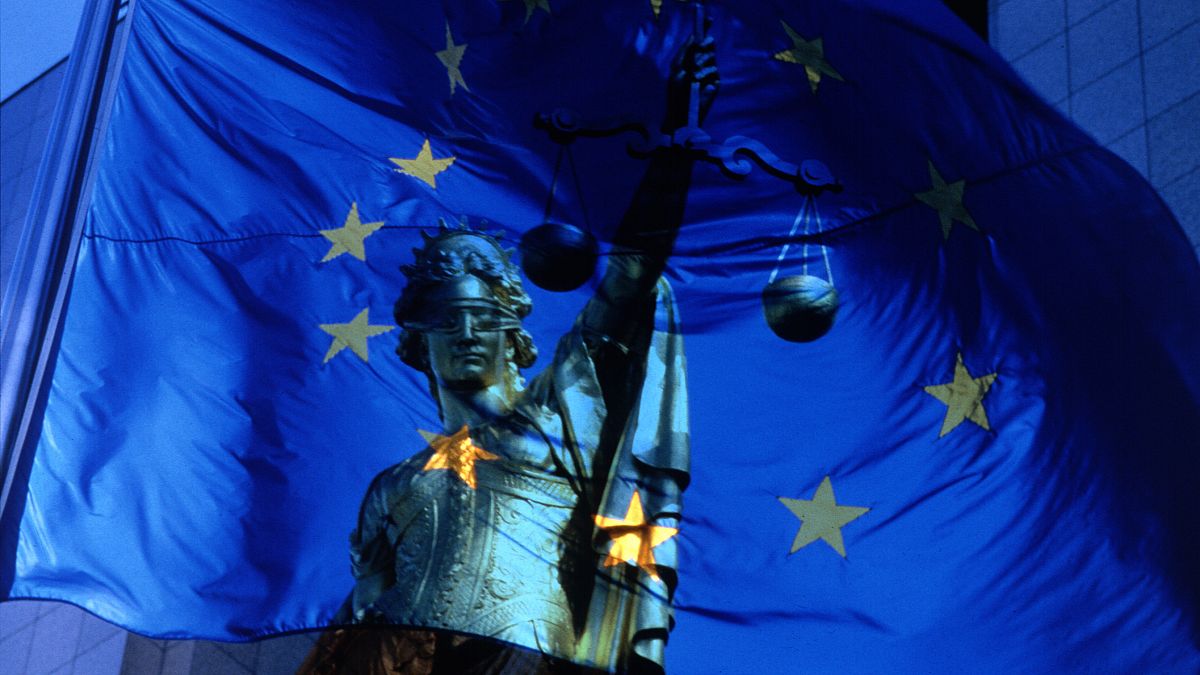In recent years, citizens of EU countries have taken to the streets, protesting against what they saw as democratic backsliding. The European Commission has introduced ways to limit regression on rule of law. We explain the issue that is shaking the EU's foundations.
The Rule of Law has increasingly come under scrutiny in Europe, but not everyone understands what it's all about.
According to the UN’s definition rule of law is the principle that:
"All persons, institutions and entities, public and private, including the State itself, are accountable to laws”
In short, no person or politician is above the law, and the very foundations of democratic society rely upon this basic rule.
"In Europe after WW2, and the end of dictatorships in Portugal, Spain Greece, and again at the fall of the Berlin Wall, we have shaped our democratic societies on three principles: democracy, respect for the rule of law and human rights," the words of former Rule of Law Commissioner Frans Timmermans. He often repeated that these three pillars of the EU were essential to the functioning of the Union.
In fact, Article 2 of the EU treaty says as much:
"The Union is founded on the values of respect for human dignity, freedom, democracy, equality, the rule of law and respect for human rights."
Rule of Law Regression
But in recent years, citizens of EU countries have taken to the streets, protesting against what they saw as democratic backsliding.
The battle between Budapest and Brussels has been one of the most reported.
In 2017, Jean-Claude Juncker, then European Commission President, repeated that:
“Europe is more than just a single market. More than money, more than a currency, more than the euro. It was always about values.”
Those values apparently under attack, according to MEPs who voted on a series of motions highlighting the risk of breaching rule of law principles.
But Hungary was not the only EU country to face scrutiny. Questions were raised over the independence of the judiciary in Poland, Bulgaria and Romania.
Attacks on media freedom and on journalists in Hungary, Croatia, Slovakia and Malta.
It appeared that certain EU countries were slowly chipping away at one of the founding pillars of the union.
Limiting democratic backsliding
While dents in EU democracy plagued her predecessor, new Commission President Ursula von der Leyen promised keep up the fight.
"Breaches of the rule of law cannot be tolerated," she said in her recent State of the Union speech.
She vowed to defend 'the integrity of our European institutions'. Whether it was about the primacy of European law, the freedom of the press, the independence of the judiciary or the sale of golden passports, "European values are not for sale," she told MEPs.
The Commission has come up with different ways of limiting backsliding.
Article 7 procedure
Written into the treaties Article 7, is often called the "nuclear option". It is the EU’s punishment clause, allowing it to discipline member states when there is a “clear risk of a serious breach” of the bloc’s core principles, such as rule of law.
But while Article 7 has been triggered against Hungary and Poland, little has come of the process to date. The process has also created animosity between powers in Brussels, Budapest and Warsaw.
Freezing EU funds
A new instrument to keep EU countries in check is the idea of linking access to EU funds to the respect of rule of law.
Currently, MEPs are battling with the EU leaders over the clause. The issue has also pitted EU nations against one another. The Netherlands has said it wants to see a clear rule of law mechanism in the final trillion-euro recovery package currently under discussion. While Hungary had threatened to veto any such move.
The jury is out on whether freezing funds will rein in democratic regression, but it would at least stop the EU bankrolling it.
Rule of Law Report
The European Commission has set out a plan to monitor rule of law abuses across the bloc in its annual rule of law report. It states that the review will 'act as a preventive tool, deepening dialogue and joint awareness of rule of law issues'.
In the run-up to the release of the first report in September 2020, a fight broke out between the Hungary's prime minister Viktor Orban and Commission Vice-president Vera Jourova.
Orban called for Jourova to resign over what he said were "derogatory comments" about democracy in the country. She was quoted in German magazine Der Spiegel as saying "Mr Orbán says often that he builds an illiberal democracy. I would say he builds a sick democracy."
In Brussels, for the institutions there is no question about defending democracy, and rule of law. Without it, they say, the Union is lost. But some politicians have been reticent to come down hard on the rule of law, for fear of further damaging the union with more EU exits. For MEP Michal Šimečka this should not be a consideration:
"Rather than fearing the exit of further member state from the EU, we should be wary of a creeping decentralised disintegration and gradual erosion of trust affecting all levels of European cooperation."
